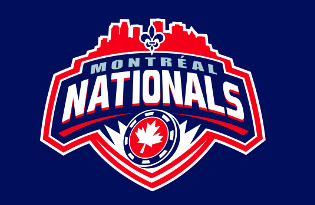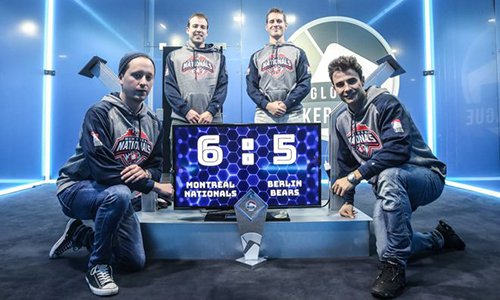Montreal Nationals Win GPL Championship in Marathon 11-Game Final Round
It was an imperfect debut season, a grand idea that received much hype and perhaps didn’t quite live up to expectations, but in the end, the Global Poker League (GPL) was a fun concept that likely established some camaraderie amongst players and maybe at least got poker fans more interested in team-format poker. Also in the end, it was the Montreal Nationals who emerged as the inaugural GPL champion, defeating the Berlin Bears in the GPL finals late last week.
 Representing Montreal in the finals were Mike McDonald, Pascal Lefrancois, and Jason Lavallee. Team manager Marc-Andre Ladouceur also played in the earlier playoff rounds and Martin Jacobson and Xuan Liu contributed toward Montreal’s run to the GPL regular-season title. Brian Rast, Sorel Mizzi, and Bill Perkins played for Berlin in the finals. Berlin’s manager was Philipp Gruissem, and Jeff Gross, Daniel Cates, and Dominik Nitsche were also on the team during the regular season.
Representing Montreal in the finals were Mike McDonald, Pascal Lefrancois, and Jason Lavallee. Team manager Marc-Andre Ladouceur also played in the earlier playoff rounds and Martin Jacobson and Xuan Liu contributed toward Montreal’s run to the GPL regular-season title. Brian Rast, Sorel Mizzi, and Bill Perkins played for Berlin in the finals. Berlin’s manager was Philipp Gruissem, and Jeff Gross, Daniel Cates, and Dominik Nitsche were also on the team during the regular season.
Eight teams made the playoffs: the Montreal Nationals, LA Sunset, Sao Paolo Mets, and San Francisco Rush from the Americas Conference and the Moscow Wolverines, Hong Kong Stars, Berlin Bears, and London Royals from the Eurasia Conference.
The quarterfinal and semifinal rounds of the playoffs were best-of-seven heads-up matches. In the quarterfinal (and opening) round of the playoffs, the top seed from each conference (Montreal and Moscow) started with 130,000 chips, with each seed down starting with 10,000 fewer chips. As the fourth seeds, San Francisco and London started with 110,000 chips in their quarterfinal matches.
That chip difference was even more pronounced in the semifinals, as the quarterfinal starting stacks were doubled. Additionally, the higher-seeded team in each matchup received a benefit of seeing their opponent’s lineup before being required to set theirs.
In the GPL finals, there were no advantages given to either team. Both Montreal and Berlin started with 500,000 chips and nobody saw any lineups early. Additionally, the finals were best-of-11, so whichever team won six heads-up matches first won the title.
To reach the finals, Montreal beat San Francisco and LA, while Berlin beat Hong Kong and Moscow.
In the finals (and in the previous two rounds), each team was required to play all three of its team members before anyone could compete in a second match. After that, though, it was anything goes, so one player from each team could have conceivably played nine matches. That would have been an unlikely scenario, however, as it would have been a bit much to ask of a player to compete for that long, especially while standing at the heads-up computer monitor in The Cube. Fatigue – both physical and mental – would have become a factor; having one player put the entire team on his or her back would have been a poor managerial decision.
In the first match of the finals, it was Berlin’s Sorel Mizzi against Montreal’s Mike “timex” McDonald; Mizzi took the heads-up contest, getting his team on the board first. Pascal Lefrançois then took down Bill Perkins to even things up and Jason Lavallee defeated Brian Rast to give Montreal a 2-1 edge.
Now that three matches were done, the team managers could have their players go in any order. Mike McDonald bounced back in the fourth match, beating Bill Perkins to keep the winning going for Montreal. Rast, who had been absolutely outstanding in the earlier rounds, then beat Lavallee to narrow it to 3-2 Montreal.
Had this been a best-of-seven series, Montreal would have won it in six, as Lefrançois outlasted Mizzi to put Montreal up 4-2. But it was a best-of-11, so there was still a ways to go.
Perkins then took out McDonald to draw Berlin within one, but Lavallee beat Rast again to make it 5-3, Montreal. Montreal needed just one more win to take home the prize.
But Sorel Mizzi wasn’t having any of that. He proceeded to beat Lefrançois and McDonald to allow Berlin to pull even and send the finals to an 11th and deciding match.
It came down to Lefrançois versus Rast in a match that lasted 43 hands. In the 30’s, it looked like Lefrançois was going to put the tournament on ice as Rast was down to seven big blinds, but Rast moved all-in five hands in a row, the first four of which Lefrançois folded, and in the fifth he doubled up Rast. Within a couple hands, it then looked like it was going to be Rast who would take it, but Lefrançois doubled to regain the lead.
On the final hand, Rast simply got put into a position he couldn’t escape. He was dealt T♠-8♦, while Lefrançois had Q♣-Q♠. Lefrançois, on the button (and small blind), completed for 12,500 while Rast checked. The flop was 8♠-4♠-Q♥; Lefrançois had a monster set of queens, while Rast paired his 8, which is quite good in heads-up poker. Rast bet 30,000 and Lefrançois simply called, trying to string along his opponent. The turn was deadly for Rast: T♥. While that improved his hand, giving him two pair, it made him a hand that was almost impossible for him to lay down. On top of that, if he improved to a full house on the river, so would Lefrançois and Rast would still lose. Everyone knew at this point the GPL championship was almost certainly decided.
Rast bet 75,000 on the turn and Lefrançois just called. The river was the 2♥ and at that point, Rast shoved. Lefrançois made the easy call, winning the hand, and giving the Montreal Nationals the first-ever Global Poker League championship. For the win, the team received $100,000 to split amongst its members.
After the final match, Mike McDonald reflected on how much fun the GPL was and how it was really the trophy and not the money, that meant a lot to everybody:
If we [the rest of the team] were watching Pascal at a final table playing for ten times these stakes we’d just be sitting there having a good time. Here we were both nervous. We were on the edge of our seats. This really made it about the poker rather than about the money and I think that’s kind of like what the goal of sportifying poker was – is to remind you of right when you were just starting out in Poker, and I think the GPL has accomplished that.
Featured image credit: globalpokerleague.com



















COMMENTS